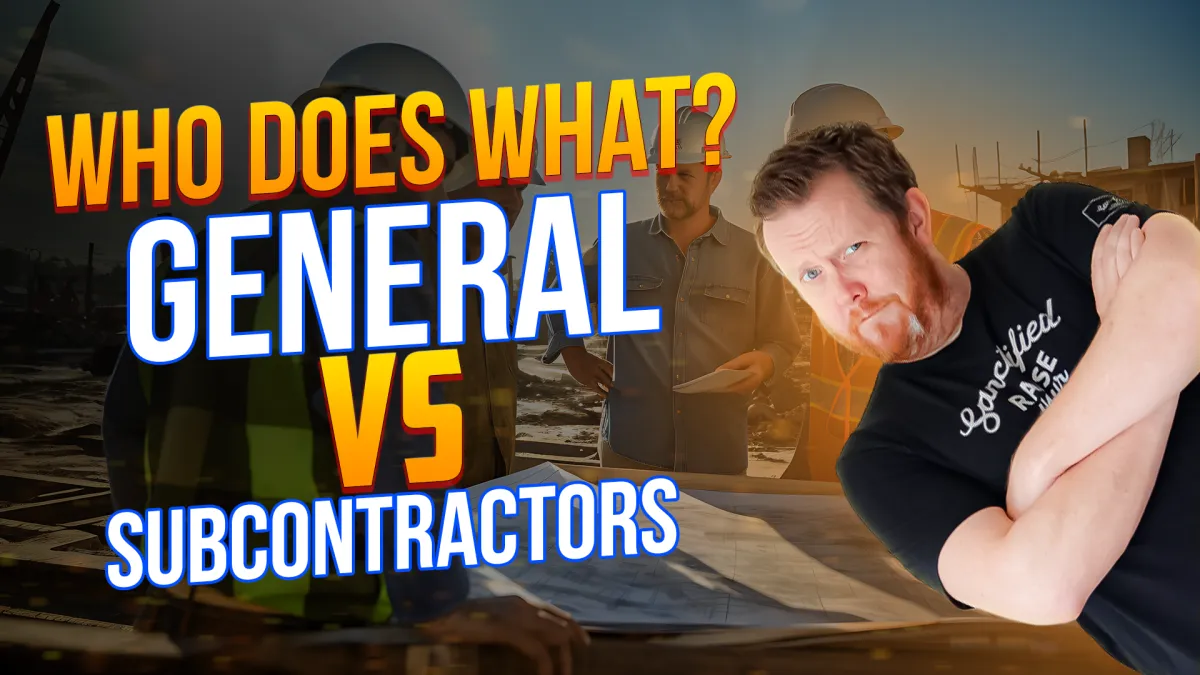
What's The Difference - General VS Subcontractors
Hey what's up everybody, it's TJ with Sanctified Homes and Construction. Today, we’re out front of one of our custom home builds to discuss an important topic: the difference between general contractors and subcontractors. Understanding these roles is crucial whether you're planning a new build or a renovation. Let’s break it down.
General Contractors (GC)
Role and Responsibilities
A general contractor (GC) is the person or company responsible for overseeing the entire construction project. This includes everything from the initial planning stages to the final completion. Here’s what a GC typically handles:
Project Management: Coordinating the entire project, ensuring that all tasks are completed on time and within budget.
Hiring Subcontractors: Bringing in specialized tradespeople, like electricians, plumbers, and carpenters, to perform specific tasks.
Scheduling: Organizing the timeline for various stages of the construction, making sure subcontractors are scheduled appropriately.
Permits and Inspections: Ensuring all necessary permits are obtained and that the work passes inspections.
Budget Management: Keeping track of expenses and managing the project’s budget to avoid overspending.
Why You Need a GC
A general contractor acts as the central point of contact and manager of the project. They ensure that everything runs smoothly, problems are addressed promptly, and the project stays on track. Without a GC, managing the various aspects of a construction project can become overwhelming and inefficient.
Subcontractors
Role and Responsibilities
Subcontractors are specialists hired by the general contractor to perform specific tasks within the larger project. These tasks are typically related to their area of expertise, such as:
Concrete Work: Pouring foundations, driveways, and other concrete structures.
Electrical Work: Installing wiring, outlets, lighting, and electrical panels.
Plumbing: Setting up water supply lines, drainage systems, and fixtures.
Framing and Carpentry: Building the structural framework of the home and detailed woodwork.
HVAC: Installing heating, ventilation, and air conditioning systems.
How Subcontractors Work
Subcontractors operate under the direction of the general contractor. They are contracted to complete specific parts of the project and are responsible for their own tools, labor, and materials. Subcontractors typically work on multiple projects for different GCs, depending on their availability and the demand for their services.
Key Differences Between GCs and Subcontractors
Scope of Work
General Contractors: Manage the overall construction project, from start to finish. They coordinate all activities, handle permits, and ensure everything is done correctly.
Subcontractors: Focus on specific tasks or trades within the project. They do not oversee the entire project but concentrate on their specialized work.
Responsibilities
General Contractors: Responsible for the project's success, including time management, budget adherence, and quality control.
Subcontractors: Responsible for completing their assigned tasks efficiently and to the required standard.
Interaction with Clients
General Contractors: Serve as the main point of contact for the client, keeping them informed about progress, changes, and any issues that arise.
Subcontractors: Typically do not interact directly with the client but report to the general contractor.
When Subcontractors Can Be GCs
Interestingly, subcontractors can also take on the role of a general contractor in some situations. For example, if a client hires a specialized firm for a specific part of their project (like carpentry or framing), that firm might oversee that part of the project as a GC, coordinating other trades as needed.
Conclusion
Understanding the roles of general contractors and subcontractors can help you navigate your construction or renovation project more effectively. General contractors oversee the entire project, ensuring everything runs smoothly, while subcontractors handle specialized tasks. Both roles are crucial to the successful completion of any construction project.
If you have more questions about the differences between general contractors and subcontractors or need assistance with your next building or remodeling project, feel free to reach out to us at Sanctified Homes.
And as always, don’t forget to raise your standard! We'll talk to you soon.

Home Building Checklist
We understand that the process of building comes with a lot of decision-making. So we created the Home Building Checklist to guide your decision-making process, and it's yours for free here!

The Blessed to Build Foundation is a 501(c)3 Non Profit providing education & resources to help homeowners and home builders make informed choices about building homes that last.
Dane County, Wisconsin
Hire a Builder
If you are looking to build a new home in the following cities, connect with Sanctified Homes & Construction to start the conversation.
Copyright Blessed to Build Foundation, Inc. 501(c)3

